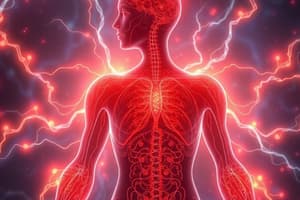Podcast
Questions and Answers
What is the primary function of glucocorticoids like cortisol in blood glucose regulation?
What is the primary function of glucocorticoids like cortisol in blood glucose regulation?
- Decrease blood glucose levels
- Stimulate insulin secretion
- Increase blood glucose levels through gluconeogenesis (correct)
- Promote glucose uptake in cells
How does growth hormone affect blood glucose levels?
How does growth hormone affect blood glucose levels?
- Enhances the action of glucagon
- Stimulates glycogenolysis in the liver
- Increases glucose uptake in cells
- Antagonizes insulin and inhibits glucose uptake by cells (correct)
What role does the liver play in regulating blood glucose levels during fasting?
What role does the liver play in regulating blood glucose levels during fasting?
- Decreases glucose production
- Adds glucose to the blood through glycogenolysis (correct)
- Stores excess glucose from a meal
- Increases gluconeogenesis only
Which hormones are considered most important for short-term regulation of blood glucose levels?
Which hormones are considered most important for short-term regulation of blood glucose levels?
What is the renal function regarding blood glucose?
What is the renal function regarding blood glucose?
Flashcards are hidden until you start studying
Study Notes
Glucocorticoids
- Glucocorticoids like cortisol are secreted by the suprarenal cortex.
- They increase blood glucose levels by stimulating gluconeogenesis.
Growth Hormone
- Secreted by the anterior pituitary gland.
- Antagonizes insulin, leading to increased blood glucose levels by:
- Inhibiting glucose uptake by cells.
- Blocking insulin action at cell membranes.
Blood Glucose Regulation
- Glucagon and epinephrine play a crucial role in short-term blood glucose regulation.
- Cortisol and growth hormone are less important in short-term regulation but play a role in long-term glucose metabolism.
Hepatic Regulation
- The liver plays a key role in maintaining blood glucose levels.
- During fasting, the liver releases glucose into the blood (glycogenolysis).
- After a carbohydrate meal, the liver takes up approximately 60% of the glucose load (glycogenesis).
Renal Regulation
- Circulating blood glucose is filtered in the glomerular filtrate.
Studying That Suits You
Use AI to generate personalized quizzes and flashcards to suit your learning preferences.




